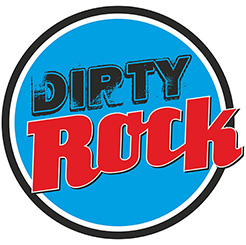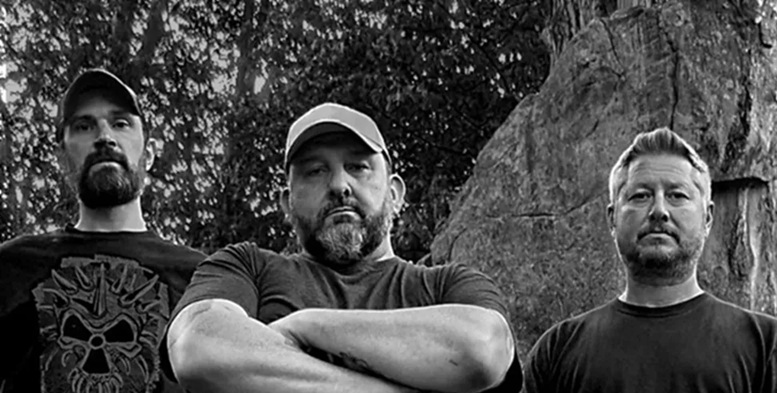New Jersey trio THE CROOKED SKULLS – Pete K. (guitars/vocals), Dave V.A. (bass) and Chuck S. (drums) – make heavy music that wears its influences openly and without pretense.
El trío de Nueva Jersey THE CROOKED SKULLS, Pete K. (guitarra y voz), Dave V.A. (bajo) y Chuck S. (batería), hace música pesada y sin adornos que deja claras sus influencias desde el primer riff.
Their self-produced debut EP Hivemind arrived December 13, 2024. It was tracked at Nada Recording Studios (Montgomery, NY) and recorded, mixed and mastered by John Naclerio. More recently, on July 20, 2025, the band issued the single “Iron Smile,” a slow-burning, groove-laden cut that features a ripping guest lead from Bob Balch (Fu Manchu, Slower, Sun and Sail Club, Minotaur). Like the EP, the single was recorded and polished at Nada with Naclerio at the helm.
Su primer y autoeditado EP, Hivemind, vio la luz el 13 de diciembre de 2024. Lo grabaron en los Nada Recording Studios (Montgomery, Nueva York) y fue grabado, mezclado y masterizado por John Naclerio. Más recientemente, el 20 de julio de 2025, lanzaron el single “Iron Smile”, un tema lento con mucho groove que cuenta con Bob Balch (Fu Manchu, Slower, Sun and Sail Club, Minotaur). Igual que el EP, el tema se grabó y remató en Nada con Naclerio a los mandos.
The Crooked Skulls’ Bandcamp frames “Iron Smile” as “a heavy statement” anchored by “thick riffs, sharp lyrics and unshakable swagger.” If you need orientation: the trio pull from Sabbath/doom/stoner tones, but the execution lands closer to sludge than some of the other tags they use.
Think sludgy, doom heft with 90s groove. It’s not an attempt at novelty, but a sincere nod to what works: straightforward heavy riffs and a steady center of gravity that reassembles familiar elements.
En su Bandcamp describen “Iron Smile” como «una declaración de peso», basada en «riffs gruesos, letras afiladas y una actitud inquebrantable». Y tienen razón. Si hay que etiquetarles, diría que beben de Sabbath, del doom y del stoner, aunque el resultado final se acerca más al sludge que a los otros géneros que mencionan.
Piensa en un sludge fangoso, con el peso del doom y el groove de los noventa. No va de inventar nada nuevo, sino de rendir tributo – con honestidad y músculo – a lo que de verdad funciona: riffs pesados y un centro de gravedad que hace de ancla y mantiene todo bien amarrado.
HIVEMIND (2024)
Sonically, Dave’s bass is Hivemind’s muscle. Those thundering, simple lines aren’t showy – no Sheehan/Flea pretension here – but they thicken the riffs at the right moments and add welcome melodic and harmonic shading. The breaks and silences are well thought-out, too: they give Pete room to let the guitar breathe when the solo comes, and they let the low-end land like a small earthquake.
In fact, the deep rumbling throughout the album really gets me going. I guess being raised around Harleys makes me nostalgic every time I hear fuzzy downtuned bass lines. The intro of “Let Me Out” reminds me of a Shovelhead idling – a stupidly specific image, but accurate: that unremitting growl gets under your skin.
El bajo de Dave es el motor de Hivemind. Esas líneas potentes, sin florituras, no buscan protagonismo – nada de virtuosismos tipo Sheehan o Flea-,pero sostienen los riffs con solidez y aportan un toque melódico cuando hace falta. Los silencios y los espacios están muy bien medidos: dejan que Pete K. respire cuando llega el solo y hacen que las frecuencias graves golpeen con fuerza, como un pequeño terremoto.
Y luego está ese grave rugido que atraviesa todo el disco. Supongo que haber crecido entre Harleys me hace sentir una punzada de nostalgia cada vez que oigo bajos distorsionados y afinados al infierno. La intro de “Let Me Out” me recuerda al ralentí de una Shovelhead: una imagen absurda, lo sé, pero exacta. Ese sonido constante se te mete dentro.
Vocally, Pete leans Lemmy-ish in places, which suits the material. There are moments on the EP where his delivery feels relaxed and perfectly placed. On the new single, however, the voice sounds a touch more forced. It’s not a dealbreaker – the song still hits hard – but it’s one of those details that suggest the band is still figuring out how to balance grit and control.
En la voz, Pete tiene un punto Lemmy, que le sienta bien al tema. En el EP suena más relajado y natural; en el nuevo single, algo más forzado. Sigue siendo un temazo, pero da la sensación de que aún están buscando el equilibrio entre la aspereza y el control.
How do the tracks on Hivemind spell that balance out?
“Bury It” pairs pinch harmonics and rugged riffs with a well-placed two-minute break: a dreamy, desert-tinged ‘90s melody floats over near-metal double-bass drums and gives the track a surprising lift.
“Skullbong” opens with space-rock nods in its otherwise doomy intro, then settles into a steady chug that never overstays its welcome.
By the time the fuzz fully lands on “Let Me Out,” the trio have ridden the late-‘90s sludge lane convincingly.
¿Y cómo se traduce todo eso en las canciones de Hivemind?
“Bury It” combina pinch harmonics y riffs rugosos con un break a mitad del tema que sorprende: una melodía noventera, casi desértica, sobre un ritmo y doble bombo que le da un aire metalero.
“Skullbong” arranca con guiños al space rock en su intro doomera, pero pronto entra en un ritmo constante, pesado, sin abusar.
Y cuando llega el fuzz de “Let Me Out”, el trío se mueve con soltura por el carril del sludge de finales de los noventa.
Comparisons are useful: there’s Greenleaf-ish Hear the Rivers tonnage here (minus Arvid’s dynamic vocals or Tommy’s guitar chops). Also – and maybe this is because I just caught their live show a couple weeks ago – The Crooked Skulls remind me a lot of High Desert Queen at times, especially with their heavy riffage (albeit with less fuzz and Rusty Miller finesse).
Si hay que buscar comparaciones, diría que tiene el cuerpo de un Greenleaf de la época Hear the Rivers (aunque sin las dinámicas vocales de Arvid ni los fraseos de Tommy). También -y quizá porque los vi en directo hace un par de semanas-, The Crooked Skulls me recuerdan un poco a High Desert Queen, sobre todo por su pegada riffera, aunque con menos fuzz y algo menos de “finura” que Rusty Miller.
Speaking of “finesse”, there’s a refreshing lack of pose to this New Jersey trio. They don’t seem out to prove how clever, “out-there” or original they are. They sound like all the good music I grew up listening to. They’re more ‘90s than old school… or are the ‘90s now ‘old school’? (*sniff, sniff)
Lo que más me gusta es justo eso: no van de nada. Ni de listos, ni de originales, ni de “mira qué riffs tan raros”. Suenan a la buena música con la que he crecido. Más a rock noventero que rock clásico… o quizá el rock de los noventa ya es rock “clásico”. (ains… duele un poco…)
Basically I’d say they’re “Albatross”-esque C.O.C. with Lemmy’s snarl, Dimebag’s pinch harmonics and Down-inspired bass lines (without the Crowbar!). In fact, even though their latest single features Fu’s Balch and they use “stoner” as a label to guide new listeners, they’re actually more Down than Kyuss.
Básicamente, diría que son como unos C.O.C. de la época de “Albatross”, con el gruñido de Lemmy, los pinch harmonics de Dimebag y graves rollo Down (¡pero sin el toque Crowbar!). De hecho, aunque su último single cuente con Balch (Fu Manchu) y utilicen “stoner” como etiqueta para orientar a nuevos oyentes, en realidad son más Down que Kyuss.
“Iron Smile” (feat. Bob Balch), 2025 single
“Iron Smile” is where the guest spot makes a difference. Bob Balch’s lead slices through the sludge with the clarity and technique that mark his Fu Manchu pedigree. It also showcases one of the big differences I often notice between many US and EU ‘stoner’ bands: in the US, the guitarists really know how to play.
That said, Balch’s solo here is a highlight, not a stunt. It provides a bracing counterpoint to the band’s low-end heaviness.
“Iron Smile” es donde la colaboración marca la diferencia. El solo de Bob Balch atraviesa el sludge con una claridad y una técnica que dejan clara su escuela Fu Manchu. También subraya algo que siempre noto entre las bandas “stoner” de EE. UU. y las europeas: en Estados Unidos, los guitarristas saben tocar de verdad.
Eso sí, el solo de Balch no es un flipe, sino un acierto: da un contrapunto limpio a la pesadez del trío.
But you have to admit that it is a far cry from the exploratory terrain Balch has been navigating recently with projects like Yawning Balch, alongside fellow desert titans Gary Arce (Yawning Man, Yawning Sons, SoftSun, Ten East), Mario Lalli (Fatso Jetson, Yawning Man, Big Scenic Nowhere, Mario Lalli and the Rubber Snake Charmers) and Bill Stinson (Yawning Man, Big Scenic Nowhere).
No, here he’s in classic rip-and-cut mode and it makes me genuinely curious how Balch got involved.
Pero hay que admitir que es un mundo aparte del terreno más experimental que Balch explora últimamente con Yawning Balch, junto a titanes del desierto como Gary Arce (Yawning Man, Yawning Sons, SoftSun, Ten East), Mario Lalli (Fatso Jetson, Yawning Man, Big Scenic Nowhere, Mario Lalli and the Rubber Snake Charmers) y Bill Stinson (Yawning Man, Big Scenic Nowhere). Aquí está en modo clásico: directo al riff y al corte. Y, sinceramente, me da curiosidad saber cómo acabó involucrado en esto.
Final Verdict
As with any new band, I have a couple doubts: live footage beyond rehearsal clips is scarce, and that raises questions about how the studio dynamics translate on stage. Also, if you notice their Spotify monthly listeners and twitch – don’t! Spotify is $hit and after all, The Crooked Skulls are just starting out – numbers won’t tell you what the record sounds like.
What I like most are the tactile things: the bass that un-grounds you, the breaks that make the solos land, the rumbling that brings a nostalgic motorbike warmth…
It’s honest and unfussy heavy music.
Como con cualquier otra banda emergente, tengo un par de dudas: apenas hay material en directo más allá de algunos ensayos grabados, así que queda por ver cómo trasladan esa energía de estudio al escenario. Y si miras sus oyentes mensuales en Spotify y te da un bajón, ¡ni caso!: Spotify es una mi€rda, y además The Crooked Skulls es una banda nueva. Las cifras no dicen nada sobre cómo suenan.
Lo que más me gusta es lo tangible: el bajo que te sacude el esternón, los silencios que dejan caer los solos en el momento justo, el ronronear grave que te devuelve ese calor nostálgico de una Harley al ralentí…
Es música heavy y honesta, sin postureo.
They have some new material on the way and I can’t wait to hear how they expand all this on the upcoming album and how they’ll translate that studio roar into full-throttle live weight. For now, Hivemind and “Iron Smile” are compact, effective statements: riff-forward, low-slung, and in your ’90s loving face.

